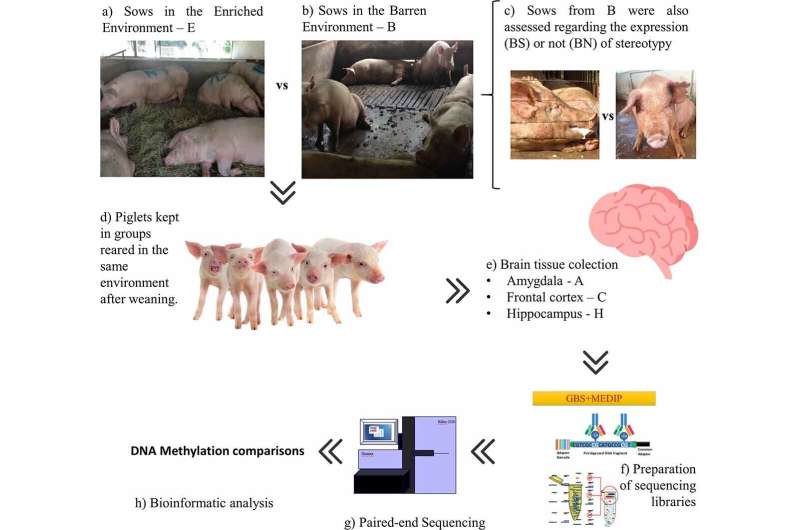Barren habitat for sows leaves imprint on piglets’ brains

In a new study, researchers from Uppsala University in Sweden, together with colleagues from the University of São Paulo, Brazil, have investigated the impact that a barren living environment for sows leaves on the next generation. The pigs in the study were bred in Brazil and kept according to breeding standards in that country. The sows’ uncomfortable and unstimulating environment brought with it several different types of changes in the epigenome of their offspring.
In many parts of the world, sows are kept confined in concrete stalls while they are pregnant. This is a bad environment for the pigs, both in terms of comfort and stimulation. As the environment induces stress in the animal, many pigs develop repetitive, or stereotyped, behavior.
Repetitive behaviors are common in domestic animals that lack sufficiently beneficial living conditions (for example horses, chickens and dogs), but they also occur in humans. In humans, for example, a repetitive behavior may involve biting nails, pulling out hair or excessively picking or tearing at the skin.
In the new study, the researchers investigated how a pregnant sow’s environment affects the brain of her offspring. They also investigated whether the stereotyped behavior of a stressed sow affects the brain of their piglets.
The study was conducted in Brazil and involved 30 sows, all of which were housed in concrete stalls (according to conventional breeding standards in that country). 90 days into their pregnancy, half of the sows were moved to an enriched environment with their hay changed daily. The rest of the sows had to stay in the same concrete stall where they lived directly on the floor. Some, but not all, of these sows developed stereotyped behavior. Afterwards, epigenetic analyses were carried out on 18 of the piglets.
An epigenetic change is a change in the genome that does not change the genetic code. Epigenetic modifications, on the other hand, are about which genes are turned on and off and when. The epigenome is influenced by the external environment, such as food, lifestyle and environmental factors.
The researchers were able to see epigenetic changes in the brains of the piglets whose mothers had to stay in the most barren environment during the entire gestation period. Changes were found in the parts of the brain that relate to emotion, learning, memory and stress response, such as the amygdala, hippocampus and prefrontal cortex. The results showed that while the epigenome in the hippocampus and prefrontal cortex was mainly influenced by the mother’s environment, the amygdala epigenome was most closely linked to the stereotypical behavior of the sow.
The molecular pathways and mechanisms related to epigenetic changes triggered by the maternal environment or stereotyped behavior in the piglet brain were also different:
i) The maternal environment has a relation to effects on neural crest development in the frontal cortex of piglets. The neural crest is an important signaling center for brain development.
ii) Both maternal environment and maternal stereotypical behavior have a relation to effects on ethanol metabolism and lipid-mediated signaling in the piglet hippocampus.
iii) The maternal environment has a relation to effects on microtubule poly/depolymerization in the piglet amygdala. Microtubule poly/depolymerization affects fundamental processes in neuroplasticity, such as memory formation and learning, especially in dendritic spines.
“This article shows how different conditions during pregnancy in pigs, in this case a poor environment or stereotypical behavior, can have variable effects on different brain regions during development of the offspring. Interestingly, these effects seem to be mediated by epigenetic programming,” explains Carlos Guerrero-Bosagna, Senior Lecturer at the Department of Organismal Biology, Uppsala University.
The study is the first to investigate the neuro-epigenetic effects of maternal inheritance in pig offspring and the first to investigate the neuro-epigenetic effects of maternal stereotypical behavior in any mammal.
“In terms of animal welfare, this is a call of attention to migrate to better systems worldwide. We show that even a small improvement can have discernible effects,” notes Guerrero-Bosagna.
The study is published in the journal Epigenetics.
More information:
Patricia Tatemoto et al, An enriched maternal environment and stereotypies of sows differentially affect the neuro-epigenome of brain regions related to emotionality in their piglets, Epigenetics (2023). DOI: 10.1080/15592294.2023.2196656
Citation:
Barren habitat for sows leaves imprint on piglets’ brains (2023, May 26)
retrieved 26 May 2023
from https://phys.org/news/2023-05-barren-habitat-imprint-piglets-brains.html
This document is subject to copyright. Apart from any fair dealing for the purpose of private study or research, no
part may be reproduced without the written permission. The content is provided for information purposes only.
For all the latest Science News Click Here
For the latest news and updates, follow us on Google News.

